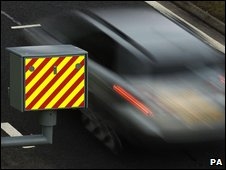The little white lie that grew

It wasn't me at the wheel, honest! |
Caught out in a fib to get out of a speeding ticket, do you put your hands up - or dig yourself deeper into a hole of your own making, asks Clive James.
In a case which has deep resonance for Britain and the entire civilized world, the whole of Australia has been glued to the media in recent weeks, following the story of an eminent judge who has ruined his reputation because he tried to lie his way out of a speeding fine that would have cost him about £36.
At the age of 70, he is about to go to jail for a minimum of two years because he failed to cough up 36 quid at the right moment.
On the face of it, you can't call his disaster a tragedy. A tragedy, according to classical principles, is a fall from high degree because of some great flaw.
Marcus Einfeld, the judge in question, was certainly of high enough degree - none higher. Queens Counsel since 1977, Australian Living Treasure 1997, United Nations Peace Award 2002, the list goes on. He retired a few years ago but has continually been brought back to judge important cases about refugees because the Australian legal system can't do without his experience and prestige.

Einfeld, here protesting against mandatory detention, faces jail. |
Or anyway it couldn't. In 2006 a speed camera in Sydney caught his silver Lexus doing 6mph over the limit. At this point we have to forget about the dizzy speed of the car and try to slow down the thought processes going on in his head. There he is, at the top of his profession, with a national, indeed international, reputation for wisdom.
This is the man who was the founding president of Australia's Human Rights and Equal Opportunities Commission. In 1987 he headed the Commission's enquiry into the living conditions of aborigines in the border area of New South Wales and Queensland, and he wept openly at evidence that a young aboriginal boy who had been denied a proper rugby ball had played instead with an old shoe.
Those were famous tears, and there is every reason to think that they were sincerely felt.
As a judge of great matters of justice, Marcus Einfeld had deservedly been revered for many years. He had a right to think of himself as the very incarnation of the law. Now here he was, with a speeding ticket in his hand, facing a fine of a paltry £36 for having exceeded the speed limit by a lousy 6mph.
Right to drive
And right there, the fatal error begins to take form. It wasn't so much the £36 fine. He could afford that. It was that the penalty points would bring him closer to losing his licence. Somehow the top judge and national treasure didn't see himself in a position where he was not allowed to drive.
“If he had said he lent the car to a secret agent whom he could not name without rendering him vulnerable to attack, Marcus Einfeld might still be enjoying his place at the top of the heap” |
Unusual, that. Many 70-year-old men of his exalted rank are very content to be driven, rather than having to do the driving. They have a man with a cap to drive them, so they can say from the back seat: watch out for the speed cameras, Bruce.
Perhaps Marcus Einfeld is one of those strange men - there are thousands of them in every country and they are nearly always men - who need to have a driving licence just so that they can get points on it, who think that the whole purpose of driving is to drive as far over the limit as they can and still get away with it, and still keep going for as long as the licence lasts even if they don't get away with it.

The judge is a respected defender of the displaced and downtrodden |
But the judge was only 6mph over the limit, which scarcely made him a boy racer. He must have thought the prospect of getting yet more points on an already point-scarred licence was an awful lot of inconvenience for practically nothing, and he must also have thought - and here the other half of the fateful mental pattern comes into play - he must also have thought of how easy it would be to get out of it.
All he had to do was say that someone else was driving the silver Lexus that day. So he said he had lent the car to an American friend, Professor Theresa Brennan. Satisfied, the magistrate dismissed the case, and the judge walked free. In just such a way, King Oedipus believed himself to be in the clear when he left Corinth.
If he - I mean the judge, not King Oedipus - had said that he had lent the car to an Australian government secret agent whom he could not name without rendering him vulnerable to attack by terrorists, Marcus Einfeld might still be enjoying his place at the top of the heap, admired by all.
But Professor Theresa Brennan was an actual figure, who could be traced. When a newspaper did trace her, it turned out that she was no longer in existence. At the time of the speeding incident she had already been dead for three years.
It was probably already too late for Marcus Einfeld to save his career. Yet he might conceivably have climbed relatively unbesmirched out of the hole he was occupying, and even drawn some sympathy for the depth to which he had dug himself in by telling one of those little fibs that almost everyone tells over small matters.
But like President Nixon in the Watergate scandal, the judge, although trying to cover up an infinitely smaller crime - dodging a £36 fine instead of okaying acts of black-bag espionage against a rival party in clear defiance of the Constitution of the United States - the judge chose to go on digging himself further towards the centre of the earth.
He said he didn't mean that Theresa Brennan. He meant another Theresa Brennan. A Greek chorus at this point might have said that the judge was anything but a natural liar, because he lied so very badly, just like most of us.
“We were left with the thought picture of a man of true stature with his life in ruins” |
Further proofs of his amateur status followed in quick succession.
Finally, in a skein of inventions that we needn't bother to unravel, he managed to implicate his own mother, aged 94, when he claimed to have been using her Toyota Corolla that day, so he couldn't have been at the wheel of his silver Lexus.
Alas, there was security camera footage to prove that his mother's Toyota Corolla had not emerged from the garage of her apartment block between daylight and dusk. We were left with the thought picture of a team of trained investigators examining a whole day's worth of CCTV footage to establish that a Toyota Corolla had remained stationary throughout. With that thought picture, and with the thought picture of a man of true stature with his life in ruins.
Truth and nothing but
Did any of this really matter? Well, obviously the original offence didn't matter much. At 6mph over the limit, the judge wasn't going to hurt anyone.

6 mph he won't forget! |
And the first lie shouldn't have mattered much either. People really do lie all the time. Often they lie to protect themselves, sometimes they lie to protect their loved ones, and there is even such a thing as a saving lie, a lie that wards off the dreadful consequences of the truth.
Ibsen wrote a play about that, called The Wild Duck. None of this means that lying is a virtue. Almost always, it's a vice to be avoided. But it's a universal vice, and its prevalence is the very reason why any properly functioning legal system has a harsh law against perjury, because a court is where the lies have to stop, or there can be no justice.
And what the judge did was knowingly to put himself on the road to perjury. He was on the road at only 6mph over the limit and he could have stopped himself by coughing up 36 quid, but there was an inner momentum.
Just why that should have been so is a question he'll be occupying himself with for the next two years at least. Everyone else will be thinking about it too, but his will be easily the finest mind concerned with the subject. He doesn't need me or anyone else to tell him that a judge who commits perjury, over no matter how trivial a matter, has sinned against the spirit of his profession.
That's why his case really is a tragedy, and not just a farce. It's a tragedy because he not only fell from high degree, there really was a tragic flaw: a capacity to forget, at the critical moment, the central ethical precept of the calling to which he had given his life.
Suddenly, belatedly, and for almost no reason, he put himself in the position of a doctor who is arraigned for selling body parts, and, because he was selling only fingernails, defends himself by saying it hadn't been him that sold the fingernails, it was Professor Theresa Brennan, or another Theresa Brennan, or his mother at the wheel of a Toyota Corolla. The doctor wasn't supposed to be selling anything, so he should have owned up.
“The tragic climax came when the distinguished Judge Marcus Einfeld found himself on the telephone to his mother” |
But the judge doesn't need to hear that from me, or from any other of the thousands of Australian experts - editorial writers, television commentators and philosophers of all descriptions - who are now picking this matter over.
The judge is already hearing about it from himself. He's hearing about the fatal road that led from the speed camera to the truly tragic climax, which wasn't the moment when one of his fellow judges had to send him down for three years, two of them without parole.
The tragic climax came when the distinguished Judge Marcus Einfeld found himself on the telephone to his mother saying: "Mum, remember how you lent me your Toyota that day?" and she said "Marcus, what have you got yourself into?"
And suddenly he was a little boy again, as all men are when the truth they must face is about a mess of their own making. |







